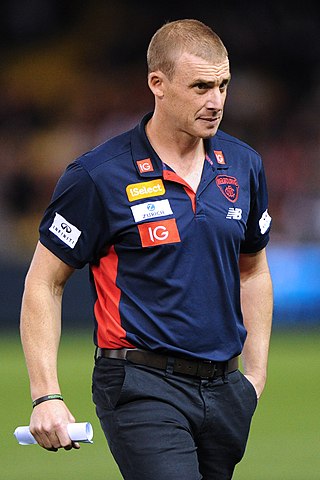Playing career
Essendon
Early career
He was recruited to the AFL by Essendon from the 1990 AFL Draft; however, due to a serious hip injury along with other injuries in his junior football career, he was not selected until pick number 79, Essendon's seventh pick and one of the last in the draft. [17] Due to injury, Hird missed out on playing for most of 1991, his first season with the club. At the end of the season, a vote was held on whether to delist him. The majority (4–2) voted in favour of Hird being delisted, but coach Kevin Sheedy, sensing a promising future for the young Hird, voted to keep him. Ultimately, Hird remained with the club. He made his senior debut against St Kilda in 1992 at Waverley Park as a late replacement for former captain Terry Daniher. Hird spent most of the season in the Essendon Reserves, which, under Denis Pagan, won the premiership that season. He achieved regular selection in the Essendon senior team during the 1993 season. In that season, he was a member of what was referred to as the "Baby Bombers", a group of young players (most notably including Hird, Mark Mercuri, Gavin Wanganeen, Dustin Fletcher, Ricky Olarenshaw, David Calthorpe, Paul Hills and Joe Misiti) that played a key role in the side winning the premiership that year. In 1994, Hird won the first of three consecutive best-and-fairest awards, culminating in his 1996 season that earned him a Brownlow Medal. [18] [19]
A series of injuries restricted Hird's appearances during the remainder of the 1990s. He played only seven games in 1997, and, although he was named captain in 1998 (a position he held until the end of 2005), he was restricted to thirteen games that year due to injury-related issues. An even worse year followed in 1999, with stress fractures in his foot keeping him to only two games. [18] [19]
Early 2000s
In 2000, both Hird and the Essendon Football Club experienced the most dominant season in AFL football to date. Injury-free, he received numerous honours, including selection in the All-Australian team and the Norm Smith Medal as best on ground in the AFL Grand Final. The Essendon team also won the Ansett Cup pre-season competition as well as the regular season premiership. The team only lost one game—against the Western Bulldogs—in the entire calendar year. [18] [19]
The year 2002 then saw Hird's worst injury, a horrific facial injury sustained in a match against Fremantle when he collided with teammate Mark McVeigh's knee, fracturing several bones; Hird was in hospital for a week and missed several weeks of the season. [20] [18] [19]
In 2003, despite again missing many games through various injuries (eight games in total), Hird tied with Scott Lucas for the best-and-fairest award. He also narrowly missed out on a second Brownlow Medal, finishing three votes shy of joint winners Mark Ricciuto, Nathan Buckley and Adam Goodes. He gained a place in the 2003 All-Australian team, the fifth and final time in his career. [18] [19]
One of Hird's more memorable performances was in his Round 3 game against West Coast in 2004. Up until three-quarter time, Hird had 19 disposals and one goal; in the final quarter, however, he managed 15 disposals and two decisive goals. [21] Despite the incredible effort, and to the consternation of fans, Hird did not receive any Brownlow Medal votes from the umpires for his 34 disposals and clutch goals, which was perceived by some as retribution for his comments earlier in the week against umpire Scott McLaren, for which he was fined $20,000. [22] Hird's winning goal was the focus of a popular instalment of the Toyota Memorable Moments advertising campaign, [23] and the hug is captured in Jamie Cooper's painting the Game That Made Australia, commissioned by the AFL in 2008 to celebrate the 150th anniversary of the sport. [24] [18] [19]
On 27 September 2005, Hird handed the captaincy to Matthew Lloyd following the side's 2005 season in which it missed the finals for the first time since 1997. [25] [18] [19]
After Lloyd sustained a season-ending hamstring injury in Round 3, 2006, Hird served briefly as acting captain until young ruckman David Hille was named acting captain for the remainder of the 2006 season. [26] [18] [19]
Hird continued to be an outstanding performer in his utility role when fit, but age was forcing him to miss games through injury with increasing frequency. He suffered broken ribs and a calf strain during his 200th and 250th games, respectively. [27] [28] [18] [19]
Final season and retirement

Despite much speculation that he would retire at the end of the 2006 season, Hird played out the 2007 season, playing 17 of a possible 22 games. Aged 34, Hird continued to feature prominently among Essendon's best players and concluded his career by winning a fifth best-and-fairest award. [18] [19]
Hird played two farewell games: his final game in Victoria at the Melbourne Cricket Ground against Richmond and his final game overall at Subiaco Oval against West Coast. The games were made higher profile as they were also the final games coached by 27-year coach Kevin Sheedy. Hird was one of the best on field in his final game, with 34 disposals, one shy of his career high. As Hird and Sheedy left the field for the last time, the crowd gave them a standing ovation. [29] [18] [19]
Before season 2008, the Archer–Hird Medal was created to honour Hird and former North Melbourne Football Club player and fellow future Australian Football Hall of Fame inductee Glenn Archer. From 2008 until 2013, the medal was awarded to the player showing the most determination, courage and skill in matches between the Kangaroos and the Bombers. [30]















